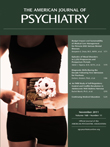Response to Adler Letter
To the Editor: Dr. Adler's letter presents an interesting and useful way of framing the debates on scientific validity versus clinical utility that occur within the personality disorder field (and, needless to say, within the work group itself). In looking at the Merriam-Webster dictionary definition of “epistemology,” I am struck with the final phrase: “the nature and grounds of knowledge, especially with reference to its limits and validity.” Unfortunately, it is this last part of the definition that is too infrequently acknowledged in the debates and that makes them sometimes appear more ideological than scientific. Although I think that we would all benefit from a greater degree of self-reflection and skepticism about our own deeply held convictions, the hope is that the debates (and the resulting hybrid model) will move the personality disorder field forward.



